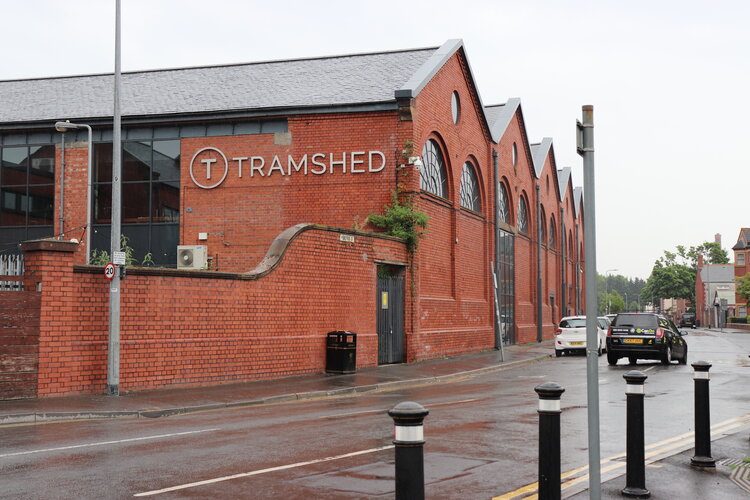
Another Treasured Cardiff Music Venue Is Under Threat & People Are Being Urged to Save It
UPDATED PLANNING APPLICATION COULD THREATEN THE EXISTENCE OF THE TRAMSHED AS A MUSIC VENUE
COMPANY BEHIND THE PLANS CONDEMNED AS “GREEDY” FOR PRIORITISING PROFITS OVER THE FUTURE OF THE VENUE AND LOCAL RESIDENTS
CARDIFF’S MUSIC SCENE HAS BEEN UNDER THREAT FROM DEVELOPERS FOR YEARS, AND PEOPLE ARE BEING URGED TO HELP SAVE THE TRAMSHED.
By Harry Waveney – The Tramshed in Grangetown, Cardiff, now under threat again. Picture: Harry Waveney.
Residents and campaigners in Cardiff are raising the alarm about yet another property development which could hurt Cardiff’s struggling music scene.
They say that a planning application for a four-storey building, complete with office space, apartments, and an undercroft, would threaten the existence of the Tramshed, a popular music venue which the proposed development would sit behind.
The application amends an earlier one for an even larger building, which was fiercely opposed by local residents.
The amendments to the planning application – put forward by the property company DS Holdings (Penarth) Ltd’s – were published on Cardiff Council’s online planning portal on the 28th May, in the midst of the Coronavirus crisis which has seen music venues across Wales forced to close, with many people worried they may struggle to open again.
Simon Baston, a DS Holdings director, has been behind high profile developments such as a planned revamp of Newport Market. Quoted by South Wales Argus, Baston said some businesses “simply don’t fit inside” the historic market anymore. This was in reference to small businesses, some who have been in operation for decades in the market, who were afraid of being turfed out due to increased rents resulting from Baston’s development.
When DS Holdings submitted their original planning application to redevelop the Tramshed, a petition was launched to stop it. Many people were worried that the plans would lead to an increase in traffic congestion because the Tramshed’s internal parking facility would be significantly reduced. One comment on the petition claimed the area was already “frighteningly congested” and “simply cannot take any more!”.
Concerns regarding the latest manifestation of the application cite similar concerns, including a lack of parking provision in the area which risks causing chaos in nearby residential streets.
The earlier version of the planning application was amended to reduce the number of storeys of the development “to address concerns raised by the surrounding community”.
But residents are still worried that the updated application development could nonetheless have a negative impact on the Tramshed, a venue popular with touring bands – possibly even leading to its closure.
Ed Townend, a sound engineer and music promoter from Cardiff who worked Tramshed’s very first gig back in 2015, told voice.wales the development would take up space currently used by acts to unload their gear effectively and privately. The alternative, using the limited space on the main road, would take up valuable residential parking, further contributing to heavy disruption in the area.
“Essentially, the developers are trying to expand on already developed land. It’s greedy and not thought through,” said Ed. “These changes could make the site unviable as a live music venue.”
This sort of story will be familiar to many people across Cardiff. The music scene has sustained similar blows in recent years with venues either under threat or lost to developers. At one point the whole of Womanby Street, an area filled with some of Cardiff’s most iconic independent music venues, was under threat. In this instance, the vocal Save Womanby Street campaign was successful. But not everywhere in Cardiff has been as lucky.
Gwdihŵ, a popular and cherished independent venue, was lost, along with two more independent businesses, when Guilford Crescent was demolished. This was in spite of a large scale popular campaign to save it. A huge demonstration – similar to the one which had helped save Womanby St – was held in protest at the decision, yet it still went ahead.
Prior to the demolition, an “autonomous direct action group”, named Guilford Peasants, occupied the buildings of the Crescent. But their grievances went much deeper than one venue. Speaking to WalesOnline, a spokesperson for the group said:
“Politics and decisions about our lives are rarely undertaken by working class people. We are often very disconnected from avenues of power, which creates widespread apathy and depression about how little control we seem to have over our lives.”
Defending Cardiff Council’s negotiations with the Marcol Estate, who own Guilford Crescent, Russell Goodway, Cardiff Council’s cabinet member for Investment and Development, said:
“All major developments in Cardiff over the past 25 years have been secured through public-private partnership and I am pleased that once again the private sector has engaged proactively.”
Goodway evidently sees close collaboration between developers and Cardiff Council – this, in the case of Gwdihŵ, only saved the front facade – as a good thing. But this approach has attracted fierce criticism.
Dan Evans of the Welsh politics podcast, Desolation Radio, is very critical of Cardiff Council’s relationship with developers, and is currently writing an article for Planet Magazine that discusses some of these issues.
“One of the main ways [Cardiff Council] make money to plug funding gaps is by selling off public land to developers, that’s the capitalist logic behind all this,” he told us.
“That’s what’s happening with most public assets in Cardiff. The New Theatre, etc. And now it’s developed into sort of a systematic compulsion that can’t be stopped, they’ve been selling off land during this crisis, it’s like it’s become an internal logic that’s bigger than any one person.”
Owain Hanmer, a resident of Grangetown, the area of Cardiff containing the Tramshed, took aim at the planning process itself, calling it a “tokenistic consultation undermines one of the basic principles of democracy.”
“People should have meaningful participation in the decisions that affect them,” he said. “We quickly need to develop alternative methods of democratic control in our communities, including things like assemblies and participatory budgeting, so that our communities begin to reflect our needs and desires rather than that of Cardiff Council and the developers.”
Critics of DS Holdings original development plans managed to force an amendment to the planning application, but the project has reared its head again with changes that don’t address many of the underlying complaints residents had.
As well as a loss of space for touring bands – the lifeblood of the Tramshed – other concerns include overloading an already busy area with more traffic, and potential noise complaints from the planning application’s proposed residential properties.
Such noise complaints were the primary concern behind the Save Womanby Street campaign which, like those now defending Tramshed, feared venues could be shut down following noise complaints despite the venues pre-dating the new developments – as has happened elsewhere.
The principle known as “Agents of Change” is a potential protection against this, and has been taken up by the Welsh Government, but there are fears these measures are still not enough to protect music venues.
Despite serious flaws with Cardiff Council’s planning system, residents across the city, but particularly Grangetown, are being encouraged to submit objections to Tramshed’s proposed redevelopment.
If the planning application receives 50 objections from residents of Grangetown then the application will be taken to Cardiff Council’s Planning Committee. Residents from outside of Grangetown can still submit objections. If the application reaches the Planning Committee this way, one of the petitioners will have the chance to speak to the Committee and could provide a focal point for a movement against the plans.
The Planning Committee is currently not meeting due to the COVID-19 pandemic. This means that, if 50 objections are submitted by residents of Grangetown, then the planning application could be stalled for a significant amount of time.
To submit an objection to the planning application, follow this link to Cardiff Council’s website. Many people have reported problems with the website. If you encounter an issue, you can instead submit objections to [email protected], quoting the planning application’s reference code, 17/01744/MJR. The Council’s consultation closes Thursday 11th June.


